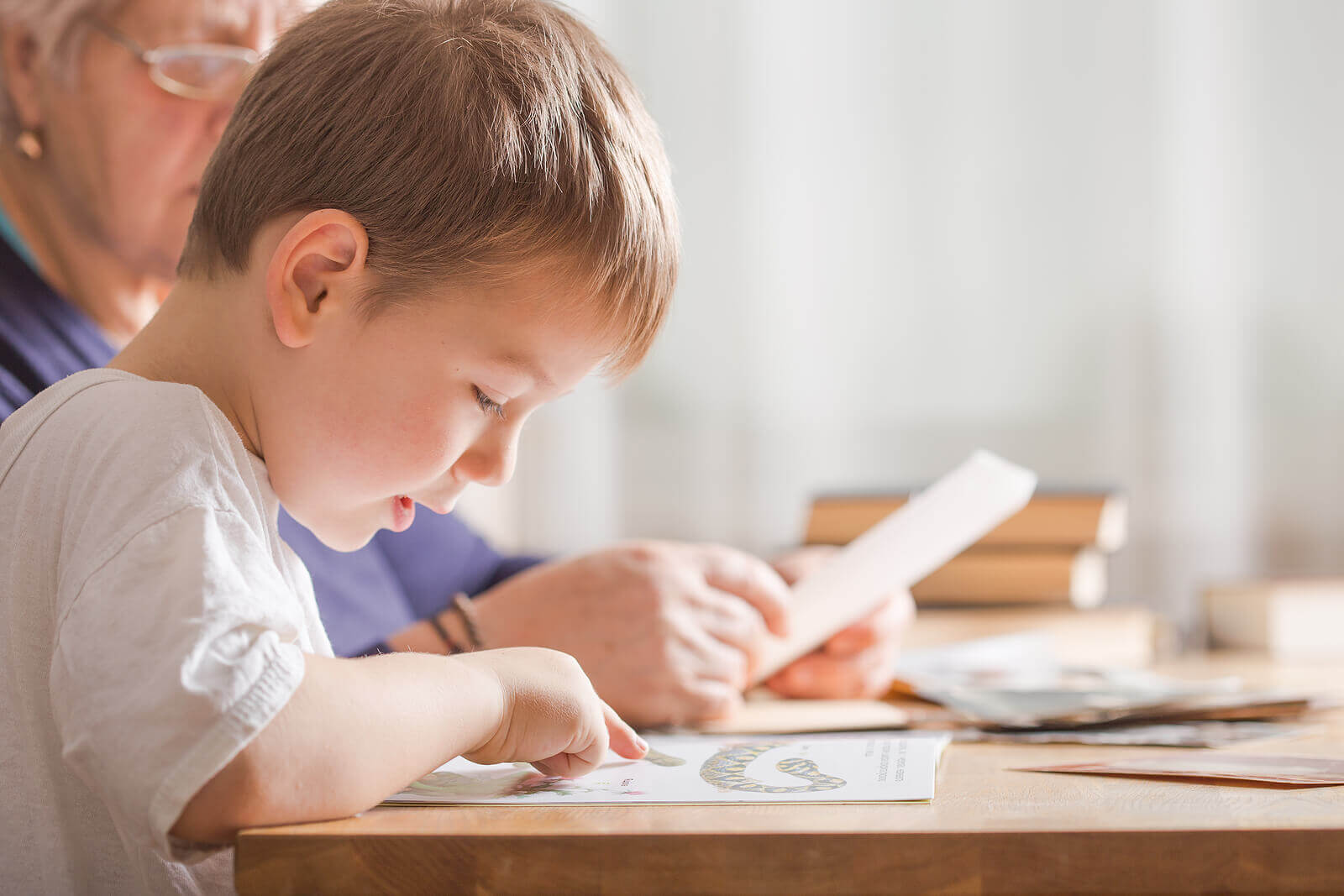The Advantages and Disadvantages of Homeschooling


Written and verified by the pedagogue and trainer María Matilde
Some parents choose to homeschool their children and teach them at home. Therefore, they don’t send their kids to a physical public or private school. Today, we’ll discuss the advantages and disadvantages of homeschooling.
Many of you may be wondering if homeschooling is good for children. And you may be wondering how they learn, if their parents are prepared to teach their children at home, how their children get socialized or how they can demonstrate what they’ve learned.
The answers to these questions require much broader and more complex discussions than we’ll be able to cover in this article. However, we’ll share the main characteristics of homeschooling.

What is homeschooling?
Homeschooling is a common practice in countries like France, Italy, and the United States. This practice allows parents to decide to educate their children at home. They can teach them the material they think is best for their children and use the methods they think are most effective.
Homeschooling can be a controversial topic, but there are a lot of reasons that parents choose the homeschool their children. The majority of families that opt to homeschool their children do so because they don’t agree with traditional teaching methods that formal institutions use. In general, parents that homeschool their children will use more innovative teaching strategies.
For example, some people choose to educate their children out in nature. Other parents may want their children to connect with other families who are also doing homeschooling.
The advantages of homeschooling
- This may be the only plausible option for families living in rural or more isolated areas. They may be too far from the urban areas where schools are located.
- They need to adapt their children’s education to their individual needs and learning styles.
- Parents can select their material and teaching style based on what they think their child should learn.
- Schedules for learning and study times are flexible.
- Teaching can be fun and motivating.
- There are no issues with stress, tests, and grades.
- Students don’t have to deal with problematic issues like bullying.
- Parents’ teaching methods are usually more active, creative, and innovative.
- Children and parents will have more quality time together to build their relationship.
- It provides children with a calmer, more relaxed, and safe learning environment.
- In the vast majority of households, it allows families to save on school fees, transportation, uniforms, supplies, etc.
- It allows children to develop and enhance their true qualities.
The disadvantages of homeschooling
- Children may have difficulty reaching age-appropriate levels of learning.
- There may be problems with a lack of socialization which could result in children not developing proper social skills.
- It may cause difficulties when homeschooled children enter the work world when they’re adults. That’s because they might not have official certificates or qualifications that prove their levels of study.
- Not all parents are prepared (psychologically and pedagogically). In addition, they may not have the time to devote to their child’s education.

Homeschooling is a complicated decision
Since homeschooling is such a complex choice and practice, some parents will decide to stick to the formal school calendar and curriculum.
That way, parents and children can follow the same content and the same times that traditional schools are using. However, there’s more flexibility with homeschooling in terms of schedules, methods, and exams.
Some families, whether or not they’re following the academic calendar and curriculum, will want to reinforce other skills and competencies at home. They may choose to focus on skills that are important to them, but may not be taught in traditional schools.
For example, they may choose to teach about the environment, sex education, artistic expression, sports, or religion. In addition, they can adapt their lessons to children with specific needs or high abilities.
Conclusion
As you can see, the advantages and disadvantages of homeschooling are numerous. There are many possibilities, but there are also specific things that parents need to keep in mind. In other words, in order to guarantee their child’s education is a positive experience and that they’re prepared for the work world, parents need to be prepared to do so.
Some parents choose to homeschool their children and teach them at home. Therefore, they don’t send their kids to a physical public or private school. Today, we’ll discuss the advantages and disadvantages of homeschooling.
Many of you may be wondering if homeschooling is good for children. And you may be wondering how they learn, if their parents are prepared to teach their children at home, how their children get socialized or how they can demonstrate what they’ve learned.
The answers to these questions require much broader and more complex discussions than we’ll be able to cover in this article. However, we’ll share the main characteristics of homeschooling.

What is homeschooling?
Homeschooling is a common practice in countries like France, Italy, and the United States. This practice allows parents to decide to educate their children at home. They can teach them the material they think is best for their children and use the methods they think are most effective.
Homeschooling can be a controversial topic, but there are a lot of reasons that parents choose the homeschool their children. The majority of families that opt to homeschool their children do so because they don’t agree with traditional teaching methods that formal institutions use. In general, parents that homeschool their children will use more innovative teaching strategies.
For example, some people choose to educate their children out in nature. Other parents may want their children to connect with other families who are also doing homeschooling.
The advantages of homeschooling
- This may be the only plausible option for families living in rural or more isolated areas. They may be too far from the urban areas where schools are located.
- They need to adapt their children’s education to their individual needs and learning styles.
- Parents can select their material and teaching style based on what they think their child should learn.
- Schedules for learning and study times are flexible.
- Teaching can be fun and motivating.
- There are no issues with stress, tests, and grades.
- Students don’t have to deal with problematic issues like bullying.
- Parents’ teaching methods are usually more active, creative, and innovative.
- Children and parents will have more quality time together to build their relationship.
- It provides children with a calmer, more relaxed, and safe learning environment.
- In the vast majority of households, it allows families to save on school fees, transportation, uniforms, supplies, etc.
- It allows children to develop and enhance their true qualities.
The disadvantages of homeschooling
- Children may have difficulty reaching age-appropriate levels of learning.
- There may be problems with a lack of socialization which could result in children not developing proper social skills.
- It may cause difficulties when homeschooled children enter the work world when they’re adults. That’s because they might not have official certificates or qualifications that prove their levels of study.
- Not all parents are prepared (psychologically and pedagogically). In addition, they may not have the time to devote to their child’s education.

Homeschooling is a complicated decision
Since homeschooling is such a complex choice and practice, some parents will decide to stick to the formal school calendar and curriculum.
That way, parents and children can follow the same content and the same times that traditional schools are using. However, there’s more flexibility with homeschooling in terms of schedules, methods, and exams.
Some families, whether or not they’re following the academic calendar and curriculum, will want to reinforce other skills and competencies at home. They may choose to focus on skills that are important to them, but may not be taught in traditional schools.
For example, they may choose to teach about the environment, sex education, artistic expression, sports, or religion. In addition, they can adapt their lessons to children with specific needs or high abilities.
Conclusion
As you can see, the advantages and disadvantages of homeschooling are numerous. There are many possibilities, but there are also specific things that parents need to keep in mind. In other words, in order to guarantee their child’s education is a positive experience and that they’re prepared for the work world, parents need to be prepared to do so.
All cited sources were thoroughly reviewed by our team to ensure their quality, reliability, currency, and validity. The bibliography of this article was considered reliable and of academic or scientific accuracy.
- Kunzman, R. y Gaither, M. (2013). Educación en el hogar: una encuesta completa de la investigación. Otra educación , 2 (1), pp. 4-59.
- Stevens, ML (2009). Reino de los niños: cultura y controversia en el movimiento de educación en el hogar . Prensa de la Universidad de Princeton. Recuperado de https://books.google.es/books?hl=es&lr=&id=lOOH21vRQRgC&oi=fnd&pg=PR9&dq=homeschooling&ots=eG3Kkti0lk&sig=7PjVrgApCzh0v MAJjPHLiaD11Us#v=onepage&q=homeschooling&f=false
- Sotés-Elizalde, M. Á., Urpí-Guercia, C. y Molinos, M. D. C. (2012). Diversidad, participación y calidad educativas: necesidades y posibilidades del Homeschooling. Recuperado de https://dadun.unav.edu/bitstream/10171/22634/2/ESE22-03-SotesUrpiMolinos.pdf
This text is provided for informational purposes only and does not replace consultation with a professional. If in doubt, consult your specialist.








